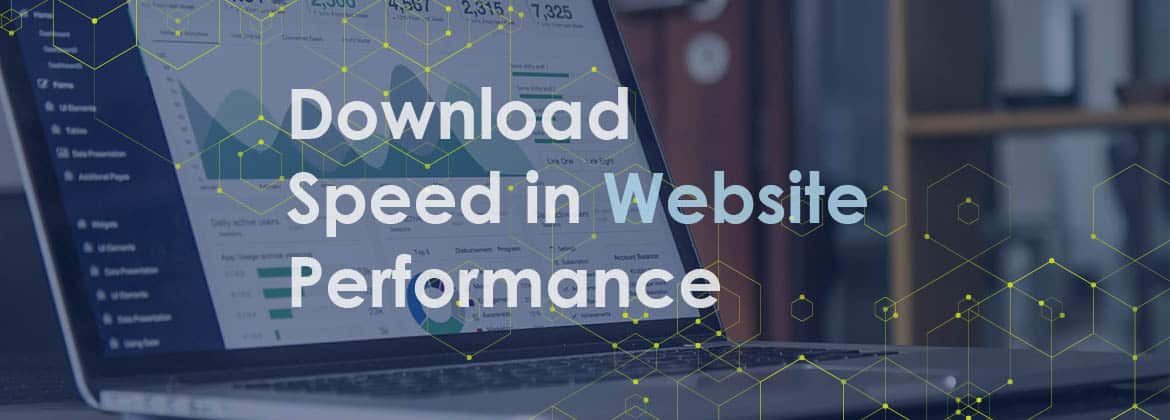How Download Speed affects Website Performance.
First, you need to understand the concept of download speed. The Download Speed is the time it takes for a device to download information from the Internet.
The download speed it’s measured in bytes per second. So the result would be the number of bytes per second transferred from the internet to that device.
There are many elements that can affect the performance of a website. Some of them are the network conditions, load on the server, and the activities on the browser. It’s important to remember that all these elements are dynamic. This means they tend to remain updating, moving, or changing in a regular way.
One of the more relevant is the network conditions since it can impact the download speed. The more bytes, the faster the connection. So, the download speed can change depending on a very fast (like 40 Mbps) or slow (2 Mbps) connection.
There are platforms that let you measure the speed between a device and a test server. The most common one is SpeedTest. Speed tests use the device’s internet connection to get the data. Here you can see information about the upload and download speed of your connection.
You can also check on other information such as the latency or ping of the network. The latency also known as ping is the amount of time it takes for a device to get the data that it asks for to the Internet.

But now…
… How does the Download Speed affect Website Performance?
The reason why the download speeds affect the performance of a website is that with a slower speed it will take longer to load the site. In other words, it will take more time to download the information that the browser needs to load the page.
As a consequence, it will take longer for the visitor to see the content of the site. And why you don’t want this to happen to your visitors? Simple, because this affects their user experience. As a result, most likely, they’ll leave your site.
Your website is your store. If the visitor doesn’t stay long enough, the visitor won’t buy anything. The good news is that nowadays most ISPs offer connections that are good enough to load almost any site. The only sites that might have problems are the ones with a big amount of dynamic elements or very large files.
This leaves you with one less problem to worry about. However, there are still some things that will affect the download speed of your website. Therefore, the performance of your site. These are some of the aspects you can check on to improve the performance of your website.
- Server/Hosting. Check if there are enough resources on the server you chose to host your website in. It must meet your website’s requirements. Otherwise, it could slow things down for everyone.
- File Types and Sizes. The larger the file size, the longer it will take for the browser to download them. Make sure to optimize your files as much as you can.
- Traffic Volume. This is important to check if your website has a high traffic volume or lots of visitors per month. If so, you need to make sure that the bandwidth of your site is enough to handle this.
- Plugins. If you have a website built in WordPress, plugins can be helpful to optimize and automate it. Yet, having too many plugins can affect the speed of your website. It’s tricky to know well which plugins are keepers and which ones are better to let go.

Good thing is that Inspiral is your ally when it comes to recommendations for your business. Here are some of the most popular plugins, their function, and whether you should use them or not.
Yoast SEO.
This plugin helps to improve your website’s general SEO score. Whit this plugin you can check on each post and page of your site and how to upgrade its SEO. It gives you tips for the titles, slugs, meta descriptions, and alt attributes of your site. It’s very user-friendly and easy to understand. This is one of our favorite plugins in Inspiral and a keeper!
Elementor.
This is one of the most used website builders. This plugin allows you to place page elements by only dragging and dropping them where you want. Elementor allows you to create professional websites without having any coding skills. I built Inspiral Growth’s website using Elementor so I can promise you this plugin is a keeper.
Akismet Spam Protection.
Akismet is the default anti-spam plugin for WordPress. Here you can check for suspicious submission in your contact form and comments. Keeps your blog clean, and your forms spam-free. This plugin is good to automate your website. However, in Inspiral we use AntiSpam Bee since it’s one of Antispam’s free versions that offer more.
Woocommerce.
This plugin allows you to turn your WordPress website into an online shop. Same as Elementor, this is a very flexible plugin when it comes to customization options. So if you want your website to sell your products and services, we say this is also a keeper.
Contact Form 7.
This is the most popular free contact form plugin for WordPress. With this plugin, users can reach you via streamlined contact forms. Is a good and easy way to connect with people. And, since the creator is the same as the Akismet plugin, Contact Form 7 also prevents spam.
These are 5 of the most popular WordPress plugins. But in case you didn’t know, there are also some plugins to optimize your website’s performance.
Nitropack.
This plugin is known as an all-in-one performance optimization service. This is a fast solution to upgrade your rank at Good for Pagespeed. Yet, in most cases, the Nitropack plugin is not good enough to pass the core web vitals. (The Core Web Vitals report shows a website performance, based on the user experience).
W3 Total Cache.
This plugin improves your website’s user experience by boosting your server performance. It reduces the download duration and provides transparent content delivery network integration. This plugin speeds up a website’s load times and upgrades the general UX.
So, now that know how download speed affects website performance. I hope these plugin recommendations help you as well.
Looking forward to keep Inspiring you!
Sofia Villamil
Web Developer.


